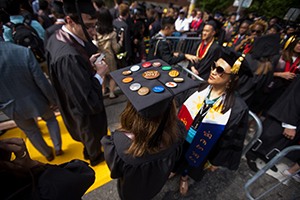PROVIDENCE, R.I. [Brown University] — Instead of making a beeline to college after high school graduation, Jennifer Avery hit the road, touring the country as a singer in a punk rock band. Zoila Bergeron worked as an interpreter in the Dominican Republic, then moved to the United States to start a career in financial services. Michael Zaskey served as a medic in the U.S. Army’s 82nd Airborne Division.
Though none went to college on the traditional timeline, all three will earn bachelor’s degrees during Brown University’s 249th Commencement this Sunday. And while each took a very different path toward processing out through the Van Wickle Gates, they all entered them the same way — through Brown’s Resumed Undergraduate Education (RUE) program.
Launched in 1973 as an experimental program, RUE gained permanent status six years later. Today, the program enrolls 24 undergraduates at Brown — all of whom have been out of high school for six years or more and have not yet completed a college degree.
Unlike those in many other programs for nontraditional students, RUE students complete the same course of study and earn the same degrees as those who came to Brown immediately or soon after high school. The chief difference is that work and life experience is more heavily weighted in the application process.
And that makes for a rather exceptional cohort of students, all of whom have taken a more circuitous path to college than the average 18-year-old.
First-year student Kaely Michels-Gualteri is a trapeze artist who toured with the Ringling Bros. & Barnum and Bailey Circus. Junior Jonathan Famery played professional soccer in France. Before coming to Brown, sophomore Damen Dume started an NGO in Mali focused on health care advancement, community development and environmental protection.
Those are just a few of the compelling backstories that RUE students lend to campus.
“The RUE program provides access and opportunity to students who have taken a nontraditional path to college,” said Maitrayee Bhattacharyya, senior associate dean of the College for diversity and inclusion. “Just as importantly, these students, with their breadth of professional and life experience, enrich the academic environment for other students here at Brown. They offer a very unique dimension of diversity and perspective to our campus.”
Turning long-held passions into a degree
After the stint in the punk rock band, Avery went on to work as a puppeteer and performance artist — and then, after years on the road, as a certified nursing assistant. This last job was rewarding and perhaps more practical, Avery says, but they [Note: Avery’s preferred pronoun is they] missed making art full time. So years removed from formal education, Avery enrolled at a community college to pursue an associate’s degree in fine arts with the idea of transforming that passion into a focused career.
Brown, with its multidisciplinary ethos, was the ideal next home to advance that work, Avery says. At Brown, Avery is a visual arts concentrator whose playful immersive multimedia pieces incorporate textiles, crafts, painting, sculpture, theater, literature and dance and explore themes around childhood, gender, feminism and mental health, among others.
